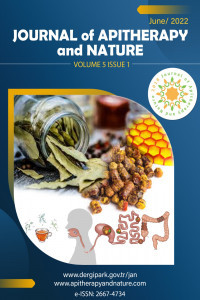Emerging Impact of Bee Propolis for Gut Health: Evidence and Mechanisms
Emerging Impact of Bee Propolis for Gut Health: Evidence and Mechanisms
Bee propolis, Acidobacteria, Proteobacteria,
___
- .
- Yayın Aralığı: Yılda 2 Sayı
- Başlangıç: 2018
- Yayıncı: Oktay YILDIZ
Zaccaria VINCENZO, Galeotti FABIO, Fachini ALFREDO, Passarella PAOLO, Daglia MARIA, Volpi NICOLA
Chemical Profile and Botanical Origin of Stingless Bee Propolis from Thailand and Indonesia
Can Propolis Inhibit Infection Dynamics of Honey Bee (Apis mellifera L.) Viruses in vitro?
A New Approach to Propolis Extraction
Saban KESKIN, Merve KESKIN, Sevgi KOLAYLI
Y. FRIÓN-HERRERA, D. GABBIA, M. CARRARA
Portuguese Propolis: A Source of Valuable Bioactivities
A CUNHA, H ALVES, C ARAÚJO, L BARROSO, M CRUZ, As FREİTAS, Aj GOMES, R GONÇALVES, R MARQUES, B MOREİRA, C PASSÃO, M PEİXOTO, H PEREİRA, R SİLVA-CARVALHO, İ VALENÇA, Am FERREİRA, F BALTAZAR, F PİNTO-RİBEİRO, S CARDOSO, R OLİVEİRA, C ALMEİDA-AGUİAR
The Influence of Propolis on Liver Pathology in Broilers
Maja MISKULIN, Ivana KLARIC, Matija DOMACINOVIC, Berislav PRAKATUR, Albina DUMIC, Daniela Cacic KENJERIC, İvan MISKULIN
The Biological Activities of Indonesian Propolis and It’ s Molecular Marker
Muhamad SAHLAN, Diah Kartika PRATAMI, Safira Candra ASIH, Andrea DEVINA, Alfiani Guntari MAHADEWI, Masafumi YOHDA, Siti FARIDA, Robiatul ADAWIYAH, Herbert SITUMORANG, Heri HERMANSYAH, Anondho WIJANARKO
Muhammad IQBAL, Tai-ping FAN, David WATSON, Sameah ALENEZI, Muhamad SAHLAN
Chemical Composition of Selected Propolis Samples from Kyrgyzstan and Kazakhstan
Argyro PETROPOULOU, Konstantia GRAIKOU, Jaroslaw WIDELSKI, Krystyna SKALICKA-WOŹNIAK, Zuriyadda SAKIPOVA, İoanna CHINOU
